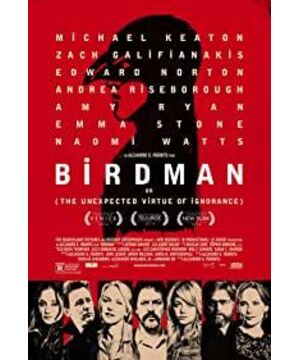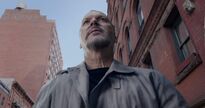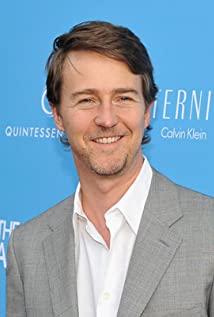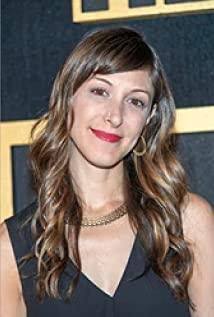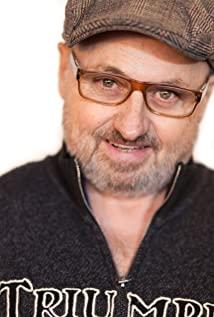The male protagonist played a superhero when he was young, and began to act in a stage play in his middle age. He chose Carver's "When We Talk About Love, What We Talk About". From the beginning to the end of the film, he was looking for confidence. Career comes first. If the plane crashes, his biggest worry is not that his daughter loses her father, but that the reports she sees in the newspaper have no news of her - such a person. From the perspective of the male protagonist, other difficulties in his life shown in the film will probably be related to his unsuccessful career in this way, and constitute a causal relationship. He was divorced, his daughter was on drugs, his new girlfriend was pregnant, and he had no money.
There are two scenes in the film where the male protagonist's daughter discusses his career with him: one is when he discovers that his daughter is smoking marijuana, and his anger also arouses his daughter's anger towards him, she says that his career is just to brush his presence. In another place, when he was performing backstage, his daughter told him that the life of the earth is 6 billion years, and that human beings are only a moment, but he wiped his mouth with that meaningful piece of paper.
When I saw him in a bar being pulled by an aunt to take a picture, but the young children didn't know him, I would feel very old at that moment: the feeling that my era has passed, but at this time, the audience loses their sense of existence. When the male lead criticized him in the newspaper, he was out of anger and beat the male lead: Similarly, the presence at this time was not the presence the male protagonist wanted at all—or even better not at all.
Then I think that the male protagonist no longer plays a superhero, and goes back to acting in a stage play - at the same time, he satirizes a bunch of superheroes in the film. In fact, looking at the evaluation of the male protagonist's daughter at this time, you will find that she is still wrong - if it is just a sense of existence, then I might as well return to my superhero - the sense of existence that the male protagonist wants is not to repeat the past The re-transcendence of life.
When Sister Furong first debuted, we regarded her as a joke, and she can continue on this road—the society needs jokes. But her turn made me think she was really awesome! And if Gillian is in the pornographic photo scandal, Yao Di can treat her public image with a similar attitude such as "I did it, I am responsible", "I am like this, I love who and so", etc., I think they're actually more positive than they are now, and it takes less time for people to fall in love with them again.
Talking and talking is far. Actors are like duckweeds, and their value is determined by others. This erratic feeling requires a way to balance it in order to go on. In the film, the male protagonist schizophrenic into a Birdman, this person provides the balance he needs. And from beginning to end, this balance has not been broken - if the male protagonist hadn't died in the end. And breaking the balance, like in "A Beautiful Mind", when Nash has no control at all, a new balance needs to be established. In fact, actors are just exaggerating our lives. Our value is often determined by others. How to balance the evaluation of others with ourselves is a question worth looking for an answer to. The good answer, in my opinion, is that the boat can keep going even against the wind. When the wind is headed, if the sails are adjusted properly, the boat can still use the force of the headwind to move itself forward. With a knowledge of physics, this isn't miraculous at all. No response from the outside world is the most terrifying, and as long as the outside world gives you a response, whether positive or negative, then you can use this force. The premise is that your concentration is enough, and you also have a Birdman to tell you how to adjust the sail.
Therefore, I appreciate the good avatar of the male protagonist in the play: Birdman. In essence, I think the male protagonist is a positive and sunny uncle. I admired the vitality he showed: Who the fuck wants to be a superhero for the rest of his life, I'm going to jump out, I'm going to try something new. So although the film is dark from the beginning to the end, it is still a good film full of vitality, not to mention, the director gave a comedy ending - but, even if it is not a comedy ending, people should still want to do it when they are middle-aged something?
View more about Birdman or (The Unexpected Virtue of Ignorance) reviews


